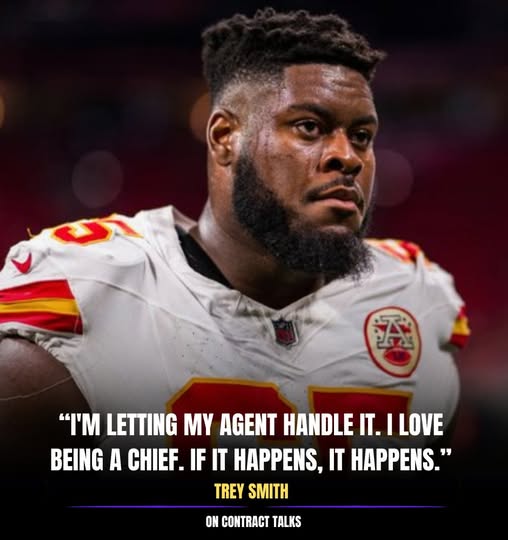In the heart of Kansas City’s relentless offensive line stands Trey Smith, a lineman whose journey to NFL stardom mirrors the grit and quiet dominance that now define his play. Now entering the final years of his rookie deal, Smith is signaling his openness to engage in extension talks with the Kansas City Chiefs—a move that not only sends a clear message about his commitment to the franchise but also puts the spotlight on a front office that’s become known for prioritizing long-term continuity in the trenches. For Smith, whose career began with uncertainty due to medical concerns in college, the willingness to ink an extension early speaks volumes about both his faith in the organization and the value he places on stability in a league that rarely offers it.
Trey Smith entered the NFL with a chip on his shoulder. A projected first-round talent out of the University of Tennessee, he plummeted to the sixth round due to lingering concerns over blood clots in his lungs, a medical red flag that scared off many general managers. For a player of his size, strength, and football IQ, it was a humbling moment. But for the Chiefs, it was a gamble that has since paid off in spades. Since being drafted in 2021, Smith has started every game he’s been healthy for and quickly earned a reputation as one of the most physically imposing right guards in football. His blend of power, toughness, and resilience has become emblematic of the Chiefs’ new-look offensive line—one built not only to protect Patrick Mahomes, but to dominate at the point of attack.
With Smith now expressing a clear openness to extension talks, it puts the ball squarely in the Chiefs’ court. This isn’t just about rewarding a player for past performance; it’s a strategic decision that touches on roster planning, cap management, and Super Bowl window preservation. The Chiefs have already invested heavily in Mahomes, and more recently, in cornerstone tackle Jawaan Taylor. But with free agency looming on the horizon for multiple linemen in the coming years, including Joe Thuney and Creed Humphrey, Kansas City has to decide how to allocate its resources. Do they lock up Smith now, potentially at a team-friendly rate before he reaches the open market? Or do they risk losing a player who’s become essential to both the run game and Mahomes’ protection?
For his part, Smith’s desire to stay in Kansas City shouldn’t come as a surprise. Since joining the Chiefs, he has flourished in an environment built on winning, culture, and consistency. Under Andy Reid’s guidance and the mentorship of veterans like Thuney, Smith has refined his technique and learned how to harness his raw physical gifts. More importantly, he’s tasted championship glory. In just three seasons, Smith already has two Super Bowl rings—something most players never achieve in a full career. The opportunity to remain a foundational piece of a dynasty clearly appeals to him, and it’s likely that he recognizes the long-term benefits—both financially and professionally—of sticking with Mahomes and Reid.
Beyond the personal motivations, the timing of Smith’s comments is also telling. The NFL is in a state of financial evolution. With the salary cap expected to balloon in the coming years due to new media rights deals and international expansion, players who sign extensions now could either lock in long-term security or miss out on more lucrative future deals. Smith’s openness to negotiate signals a level of pragmatism; he may be willing to accept less than market value in exchange for guaranteed money and organizational stability. From the team’s perspective, getting ahead of the market is always smart business. If they wait until Smith’s contract is set to expire, his price could soar—especially if he makes a Pro Bowl or earns All-Pro honors next season, which many believe is within reach.
Another layer to this situation is the emotional and psychological makeup of Trey Smith. He is not a loud self-promoter, nor does he demand attention. Instead, he plays with a ferocious intensity that is matched by his humility off the field. Teammates rave about his leadership, his professionalism, and his drive. In a league where character matters more than most fans realize, Smith has checked every box. His willingness to talk extension now is less about leveraging power and more about making clear where his heart lies. Kansas City took a chance on him when others wouldn’t, and loyalty still counts for something in this game.
But the Chiefs are not in the business of handing out extensions based on sentiment alone. General Manager Brett Veach has constructed a front office known for its ruthlessness as much as its brilliance. The decision to let go of veterans like Orlando Brown Jr. and Frank Clark in recent offseasons proves that no one is safe from the chopping block when cap efficiency is on the line. Still, Veach has shown a consistent tendency to lock up homegrown talent—especially those who have developed into leaders in the locker room and impact players on the field. Extending Smith would fit neatly into that philosophy.
There’s also the matter of optics. Keeping Smith sends a message to future draft picks and current young players on the roster: if you perform at a high level and buy into the team culture, you’ll be rewarded. That sort of clarity can be invaluable in maintaining a competitive locker room. It’s a strategy the Chiefs have used to great effect over the last five years, and it has helped fuel the team’s sustained excellence. By contrast, letting a player like Smith walk—or even dragging negotiations into the public sphere—could create unnecessary distractions and erode trust.
From a technical standpoint, Smith’s value goes beyond the stat sheet. Guards rarely garner the kind of attention tackles or skill players do, but their role is just as essential—especially in today’s NFL, where interior pass rushers like Chris Jones, Aaron Donald, and Quinnen Williams can wreck games from the inside out. Smith’s ability to neutralize those threats has played a crucial role in Mahomes having time to operate in the pocket. Additionally, his run-blocking prowess has helped Kansas City maintain offensive balance, a critical factor during their playoff runs.
As of now, no official figures have been released, and both sides appear content to proceed quietly. That said, the tone around the situation is unmistakably positive. Smith isn’t issuing ultimatums, and the team isn’t dodging the topic. This mutual interest in a deal, combined with Smith’s consistent performance, makes an eventual extension feel more like a matter of “when” rather than “if.” And in a league where long-term success is often built in the shadows—away from the highlight reels and headline trades—keeping Trey Smith in Kansas City could be one of the most important moves the Chiefs make this offseason.
Looking ahead, Smith’s role could become even more central. As the team evolves and younger players step into larger roles, having a stabilizing force on the line is vital. Whether it’s anchoring the right side, mentoring rookies, or simply showing up every Sunday to deliver body blows in the trenches, Smith has already proven he’s up to the task. The Chiefs know what they have in him. He’s not just a cog in the machine—he’s part of the engine. And locking him in for the foreseeable future might just be the next step in keeping Kansas City’s dynasty humming.
So while extension talks may still be in their infancy, Trey Smith’s stance offers clarity in an often chaotic league. He wants to be here. He wants to win. And he’s ready to commit to the franchise that believed in him when so many others passed him by. That kind of loyalty, matched with elite performance, doesn’t come around often. The Chiefs would be wise not to overthink it.



